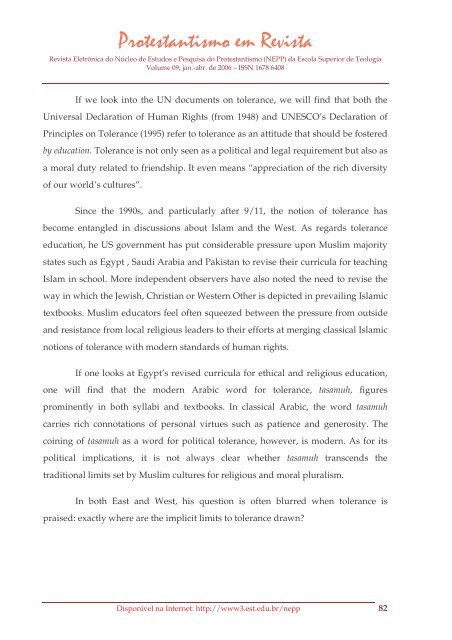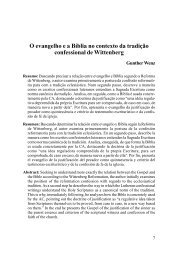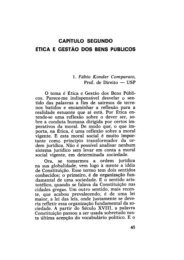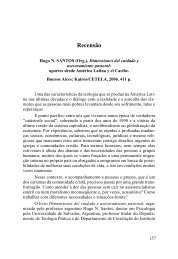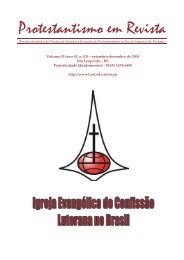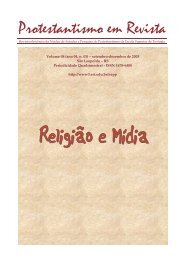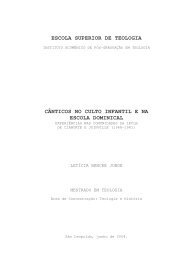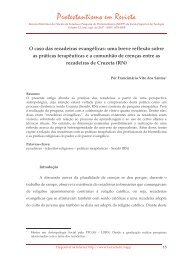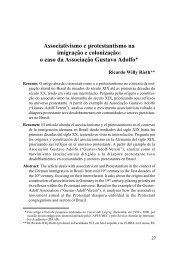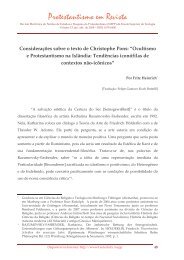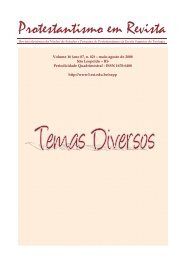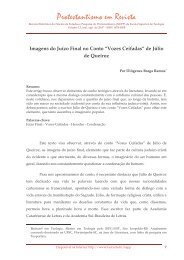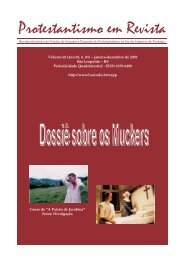Protestantismo em Revista, volume 09 (Ano 05, n.1) - Faculdades EST
Protestantismo em Revista, volume 09 (Ano 05, n.1) - Faculdades EST
Protestantismo em Revista, volume 09 (Ano 05, n.1) - Faculdades EST
You also want an ePaper? Increase the reach of your titles
YUMPU automatically turns print PDFs into web optimized ePapers that Google loves.
<strong>Revista</strong> Eletrônica do Núcleo de Estudos e Pesquisa do <strong>Protestantismo</strong> (NEPP) da Escola Superior de TeologiaVolume <strong>09</strong>, jan.-abr. de 2006 – ISSN 1678 6408If we look into the UN documents on tolerance, we will find that both theUniversal Declaration of Human Rights (from 1948) and UNESCO’s Declaration ofPrinciples on Tolerance (1995) refer to tolerance as an attitude that should be fosteredby education. Tolerance is not only seen as a political and legal requir<strong>em</strong>ent but also asa moral duty related to friendship. It even means “appreciation of the rich diversityof our world’s cultures”.Since the 1990s, and particularly after 9/11, the notion of tolerance hasbecome entangled in discussions about Islam and the West. As regards toleranceeducation, he US government has put considerable pressure upon Muslim majoritystates such as Egypt , Saudi Arabia and Pakistan to revise their curricula for teachingIslam in school. More independent observers have also noted the need to revise theway in which the Jewish, Christian or Western Other is depicted in prevailing Islamictextbooks. Muslim educators feel often squeezed between the pressure from outsideand resistance from local religious leaders to their efforts at merging classical Islamicnotions of tolerance with modern standards of human rights.If one looks at Egypt’s revised curricula for ethical and religious education,one will find that the modern Arabic word for tolerance, tasamuh, figuresprominently in both syllabi and textbooks. In classical Arabic, the word tasamuhcarries rich connotations of personal virtues such as patience and generosity. Thecoining of tasamuh as a word for political tolerance, however, is modern. As for itspolitical implications, it is not always clear whether tasamuh transcends thetraditional limits set by Muslim cultures for religious and moral pluralism.In both East and West, his question is often blurred when tolerance ispraised: exactly where are the implicit limits to tolerance drawn?Disponível na Internet: http://www3.est.edu.br/nepp 82


